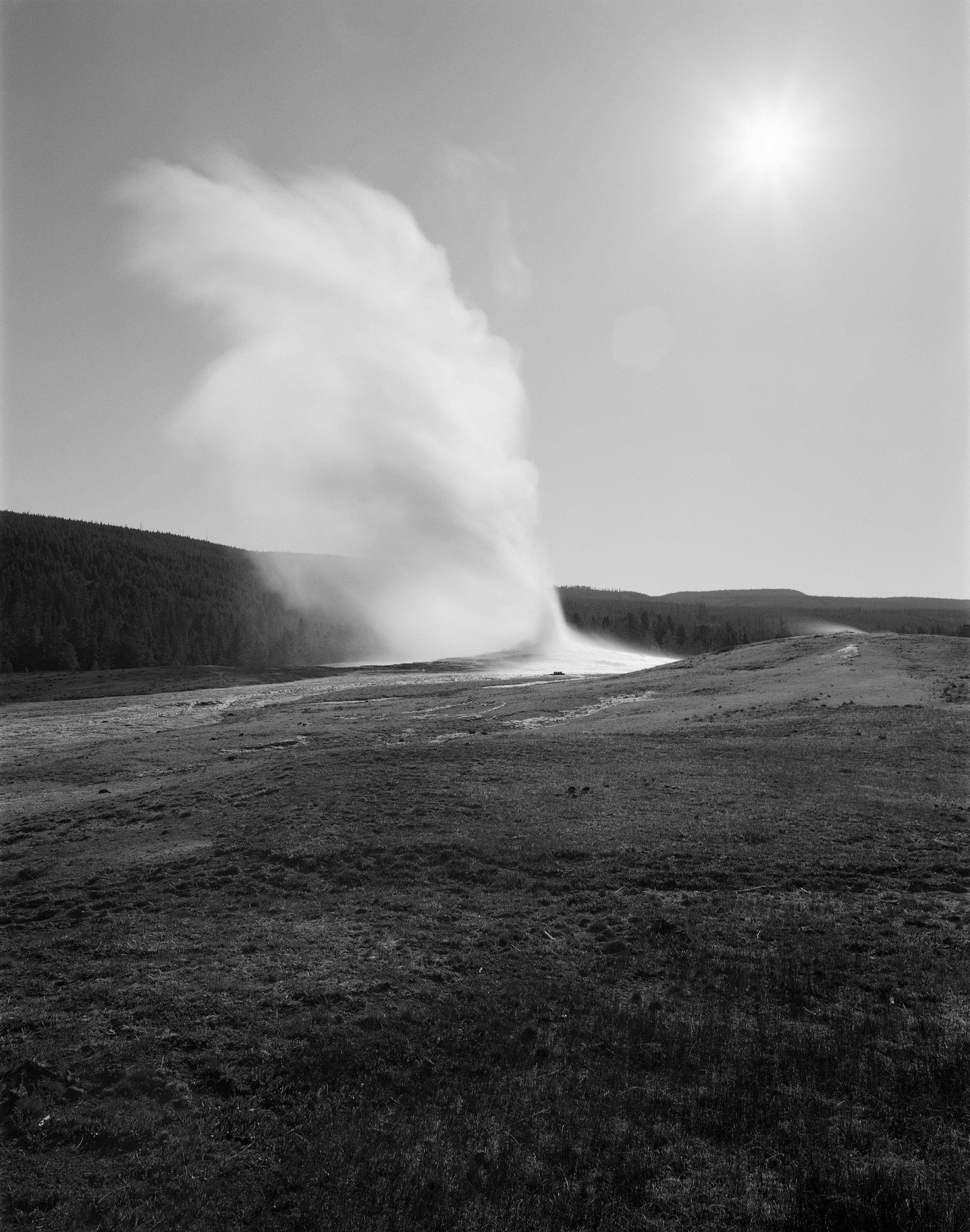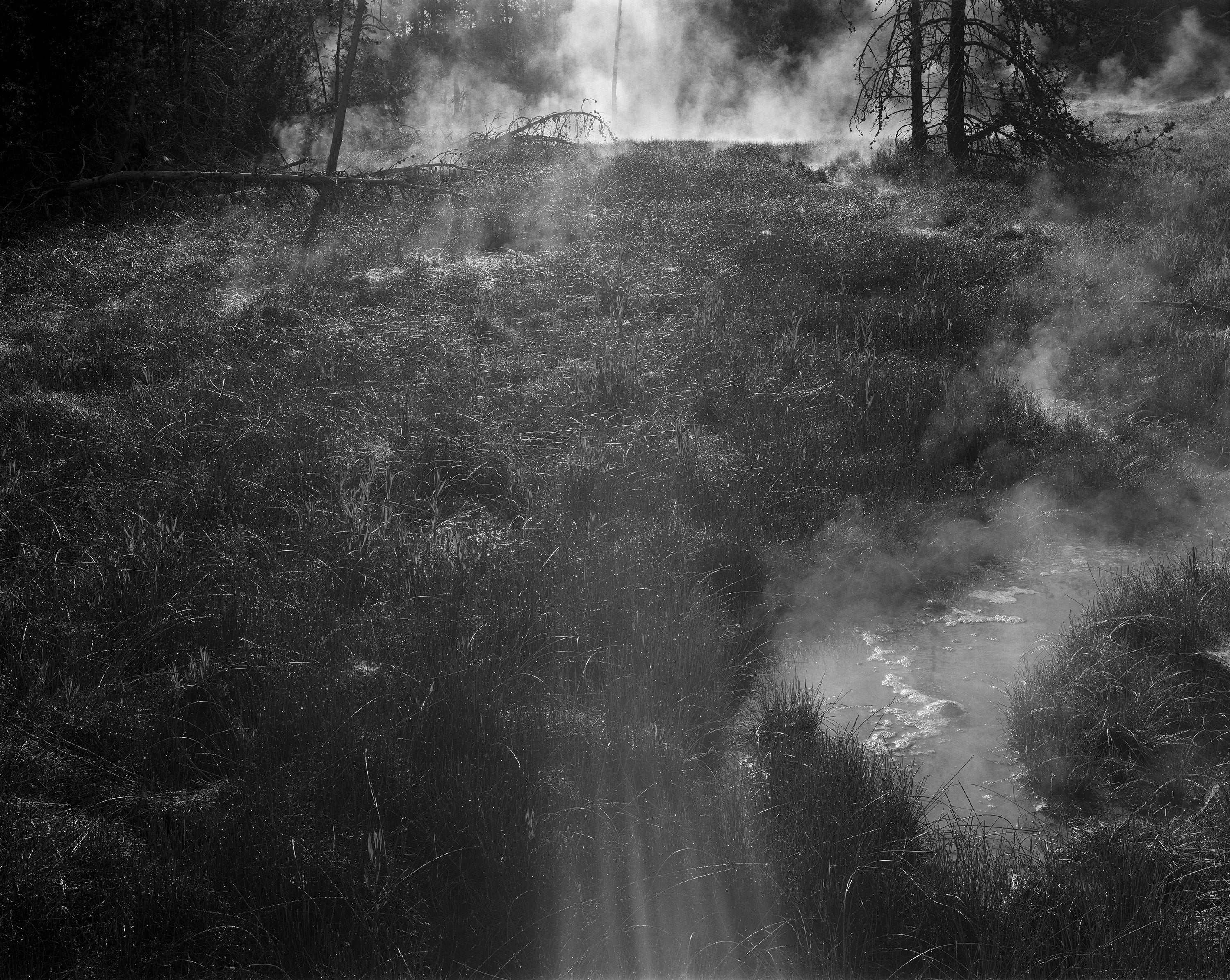In our fourth collection, Caldera, Christopher Campbell contemplates Yellowstone not as a national park but as a “significant piece of raw geology, with human beings lurking at its edges.” This singular and visionary meditation on time and existence is a revelation in study, presence, and observation.
Strata’s first show, Western Contemporary, presented works by different artists as a way to represent and reimagine places, beings, and ideas that connect the vast geographies—both real and mythical—of the American West. With this exploration of one place, Strata continues its reflection on the relationship between people and environment in this region.
CHRISTOPHER CAMPBELL (b. 1971) is a photographer living and working in the American West. He has lived with his wife, Michelle, in Four Corners, Montana, for three decades. Campbell’s work explores two polestars of the West, the land and the people. The land exists independently of the people who tenant or pass over it, yet people can’t exist without the land.
The American West is a landscape of enduring geology, continuously changing with the passage of time. The land’s rigid surface conceals a delicate nature, one that indelibly registers human exploitation and trespasses. Campbell has long understood that the American West is in crisis due to overdevelopment, extractive processes, and increased demands on ranching and agriculture. These practices and pressures place an untenable demand on two of the West’s most precious resources: open space and water. Campbell’s exploration of place seeks to reveal the devastating beauty inherent in the land, while being honest about how our destructive tendencies threaten what sustains us.

“In Caldera, I consider Yellowstone not as a national park or cultural monument but as a significant piece of raw geology, with human beings lurking at its edges. Yellowstone is a place where it is easy to imagine a nascent earth in the process of becoming. It takes little time there to understand that beginning never ends. Time on such an infinite scale renders notions of origin as irrelevant as concepts of culmination or conclusion.
A caldera is a large, deep depression on the surface of a volcano. Yellowstone’s caldera was created by repeated eruptions of a supervolcano of world-altering proportions over millions of years; the most recent one happened approximately 640,000 years ago (as a point of reference, it was 1,000 times larger than the 1980 eruption of Mount Saint Helens). Time in Yellowstone is strongly felt because its imprint can be read in the geology and geography—and on a smaller scale, in the biological record, and even more minutely, in evidence left by humans, a sliver of time in the existence of our planet.
Passing time in this most astonishing, astounding of places forces a realization that to live is to be present, for a moment, in the world. The past is as evident as the future and allows us to forget from where we have come or about where we are going. Simply being here is proof that we will get there. The only thing that matters is that we have arrived.
We know that we will have to leave Yellowstone and be somewhere else, but Yellowstone, as place and metaphor, remains in us. We are rooted in nature, and to live within it, and time, is to accept our vulnerability. We can recognize the edge (contemplate the void). Photographic time, that fraction of an instant, and the lasting evidence—trace, mark, print—of what was there, again here, the light and dark on the land as seen in the opening and closing of the aperture, mirrors the experience of this place perfectly.
The Greater Yellowstone Ecosystem is a lesson in form and shape. The churning cycles of thermal features, the rhythmic drop of a waterfall, the ongoing movement of herd animals, the constant work of a Clark’s Nutcracker, the soughing wind high in the lodgepole, can replace human ideas of chaos and disorder, all our secret anxieties, with beautiful acceptance. Nature is easy.”
—Christopher Campbell
Programming
Christopher Campbell: Introduction to Black and White Film Photography
2-Day Workshop
Consecutive Saturdays, August 2 and August 9, 2025
10am–5pm
Part of Strata Workshops Summer Series
Join photographer Christopher Campbell at Strata’s project space for an introductory course in film-based 35mm black and white photography. The class is designed to provide you with a foundational understanding of the technical, aesthetic, and conceptual aspects of photography as it relates to the visual arts. Specific areas of technical instruction will include: the manual functions of your 35mm camera and exposing 35mm black and white film.
Opening Reception
Saturday, August 16, 2025
5–8pm
Join us for the opening of Caldera: Photographs by Christopher Campbell.
Drinks by our buds Rick and Jona @latentcommons.





